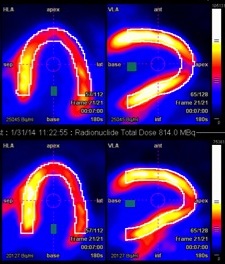
In the course of his work researching cardiac PET imaging, cardiologist Jamieson Bourque, MD, MHS, Director of Nuclear Cardiology at UVA, uncovered a large group of patients who exhibited narrowing of small arteries in the heart, or microvascular disease (MVD). “When they asked me what they should do, I really didn’t have a fact-based answer,” Bourque recalls. When he consulted the literature, he found many plausible approaches to MVD treatment, including aggressive use of medications and exercise, but little data supporting their use.
In response, Bourque has launched a study on MVD that he hopes will help establish clear guidelines for treating this condition. “I’ve started this trial to find out how patients with MVD respond to available treatments,” he says. “I also want to know more about who develops MVD so we can more accurately identify at-risk populations.” This is particularly important because MVD puts individuals, especially women and diabetics, at a high risk of heart attacks and other cardiac events.
Using Angina as a Starting Point
In coronary artery disease (CAD), plaque forms in coronary arteries and constricts blood flow, which can lead to angina. However, more than 50 percent of stable patients with angina have no signs of CAD. In these cases, angina may instead be a sign of MVD, which is believed to result from atherosclerotic changes, inflammation and oxidative stress. Using angina as a starting point, Bourque’s first challenge is to determine how many patients without CAD have MVD.
Accordingly, for the first phase of the study, Bourque is recruiting 165 patients with angina but without evidence of obstructive disease on their angiograms. He will record key demographic information, atherosclerotic risk factors, medication regimen and important findings from their physical examination. Then patients will undergo a cardiac MRI with an assessment of their myocardial perfusion reserve, an indicator of MVD. Among the hypotheses Bourque will be testing is whether advanced age and post-menopausal status are common characteristics of those with MVD. Bourque will also be conducting a quality of life assessment of these patients with non-CAD angina. “I have a strong desire to know more about how their symptoms impact their lives,” he says.
Exploring Effective Treatments
For the second phase of the study, Bourque will recruit 44 patients with MVD, including some of those who participated in phase one, and will assess their response to different treatment regimens. “One of the characteristics of this trial is that none of these approaches we are using are experimental,” Bourque says. “They are all well-established treatments for heart disease. They just haven’t been proven to help in microvascular disease.”
During the 20-week trial, all patients will be put on aggressive drug therapy that includes beta blockers, ACE inhibitors and statins. After eight weeks, half the group will also be placed in a supervised exercise program. All participants will have a cardiac PET and a cardiac MRI before and after the trial, while members of the exercise group will have an additional MRI at the start of their exercise program. “We are interested in seeing if there are incremental changes in myocardial perfusion reserve among the participants,” Bourque says. He will also be measuring such factors as aerobic capacity and anginal status.
“I think participation in this trial will be of great value for patients, especially those with MVD,” Bourque says. “We are hoping that regardless of which group our phase two patients are in — medical therapy or medical therapy with exercise — that they will find their quality of life improved.”
Study Eligibility
To be eligible for the MVD trial, patients should meet the following criteria:
- Age 21 to 85
- Anginal symptoms of chest pain or exertional dyspnea suspected to be secondary to myocardial ischemia
- A coronary angiogram without obstructive epicardial coronary artery disease (>70% epicardial stenosis or fractional flow reserve of <0.80)
Patients with the following conditions will not be eligible:
- A prior CABG procedure
- Prior myocardial infarction
- Inability to exercise
- Contraindications to cardiac MR
- Pregnancy
- Severe liver disease
All fees for testing, medication and treatment provided under the study are fully covered. Patients will be paid $75 for participating in the phase one cardiac MRI and follow-up. Those patients with MVD and who participate in the randomized, phase two study will receive an additional $175 to compensate for their time and travel expenses.
To find out if your patient is eligible to participate in the MVD trial (IRB# 17197), contact study coordinator Niki Sprouse, RN, at 434.982.1058 or njb6m@virginia.edu.
Learn more about the treatments available at UVA Heart & Vascular Center.